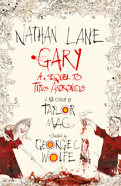Tony Nominees Kristine Nielsen and Julie White on Being Surrounded by Death and Dicks in Broadway's Gary

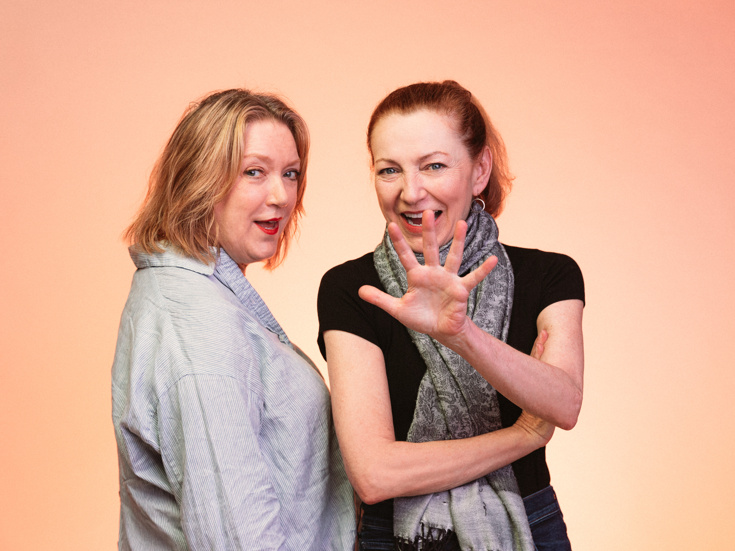
(Photos by Emilio Madrid-Kuser for Broadway.com)
After a whirlwind process of getting Taylor Mac’s new play Gary: A Sequel to Titus Andronicus on its feet, Tony-nominated stars Kristine Nielsen and Julie White are basking in the 2019 awards season. When Andrea Martin was injured and had to withdraw from the production, Nielsen took on her role as beleaguered maid Janice, while White stepped into Nielsen’s previous role as hysterical midwife Carol. Broadway.com sat down with the acclaimed actresses (this is Nielsen’s second Tony nom and White’s third; she won in 2007 for The Little Dog Laughed) to chat about the dark comedy’s chaos, carnage and (ahem!) cocks.
What is it like going to work every day surrounded by corpses and penises?
Kristine: It's heaven. [Laughs.]
Julie: We love our set. We love our set designer Santo Laquasto. Our set is filled with terrifying—and yet kind of funny-looking—dead bodies, all of them with their dicks out. So, it's pretty nutty.
Kristine: They are like dolls. We've named some of them. Isn't it Mr. Peep? What's his name? It's the one that hits Nathan so graciously every night in the face? Mr. Peepers or something. There is one that looks like Abraham Lincoln.
Julie: There's one on the ground that looks so much like Bernie Sanders. She's cleaning up after them, so she's real matter of fact with them, but my character is freaked out by them, so I do a lot of screaming.
Kristine: You like the soldiers.
Julie: I like the handsome ones.
What were your first impressions of this play when you first took a look at it?
Kristine: My first impression of this play was that it was a lot of words.
Julie: Kristine did a workshop of it over two years ago, and it was double the play. Did it have an act break?
Kristine: No. It was just long, long, long.
Julie: But [playwright] Taylor [Mac] was coming off a play that lasted 24 hours, so he doesn't think about time in the same way.
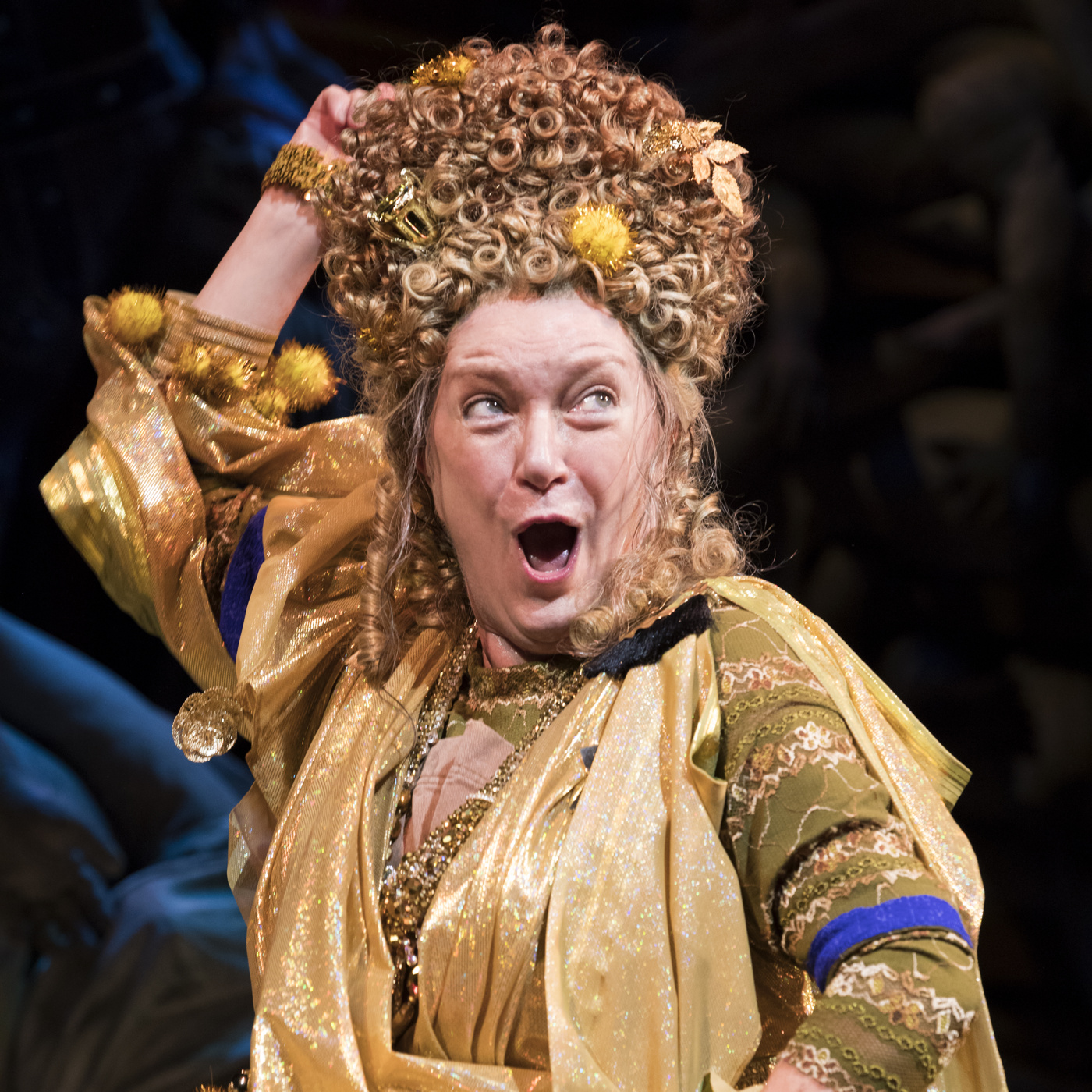
Kristine: I think you're right there. Ultimately, it sort of pared itself out. But that was the first impression. It was like, “This is a very smart play. I'm not smart enough, maybe.” I always [feel that way about] Taylor. I sit with a dictionary—I think I know what a word means, and then I have to look it up again to make sure I really know what it means. Sometimes you think you know something, and you don't. He's so clever.
Julie: The language is incredible. Do you have an actual dictionary? Because you know you can just do that on your phone.
Kristine: I actually have a dictionary.
Let's not scare the audience—you don’t actually need to know any big words or even anything about Shakespeare to see Gary.
Julie: No, because it's also just a bunch of clowning. It’s all in there: the humor, the highbrow and the low.
Kristine: Laugh, cry, laugh, cry.
Julie: And, you know, fart jokes.
Kristine: Lots of those.
Julie: It's all in there. It's like the parables in the Bible—you could take them at their face value, or the longer you thought about it, there was something else in there. I find it like that. And because I had a very short rehearsal period, I just had to make choices and go. But as it's settling into me, I'm like, “I get this!” Oh, man. I love that.
Kristine: I like to say, it never settles in, Julie. Can I just say that? Every night it's like working with an animal. It's a new, wonderful experience.
Let's talk about your rehearsal period. It was trial by fire for both of you in different ways. Tell us what happened.
Kristine: Well, I was doing Carol for a very brief time, it seems like now.
Julie: Did you ever get out of the rehearsal room?
Kristine: I did do a tech. I did do some blood—not to give anything away with your wonderful blood stuff—but I did get to do the speech. Nathan always tortures her by saying, “There was a big laugh here!” We never had any audience. I don't know who that big laugh was!
Julie: I think it's easier for me because I'd never seen Krissy do it. I got to come into it completely clean. Whereas you had been rehearsing for six weeks—and prior to that, some sort of a workshop kind of situation.
Kristine: That was just around the table.
Julie: She had to get Carol out of her ear, and get Andrea out of her ear in order to find her own way into Janice.
Kristine: We just jumped on top of Nathan, and he carried us over the finish line. I give him so much credit for that.
Julie: He is amazing.
Kristine: The tea-party scene, when we're all together, was the hardest for me was to learn. To not listen to Julie, but always listen to Julie.
Julie: Oh, that must have been so freaky. I mean, ultimately, we can't remember [the rehearsal process]. I just remember that one time in your dressing room when we were both crying.
Kristine: I was like, “It can't be seen!” This can't be seen.
Julie: [sobbing] We can't do it!
Kristine: I'll never work again! You know, that kind of feeling.
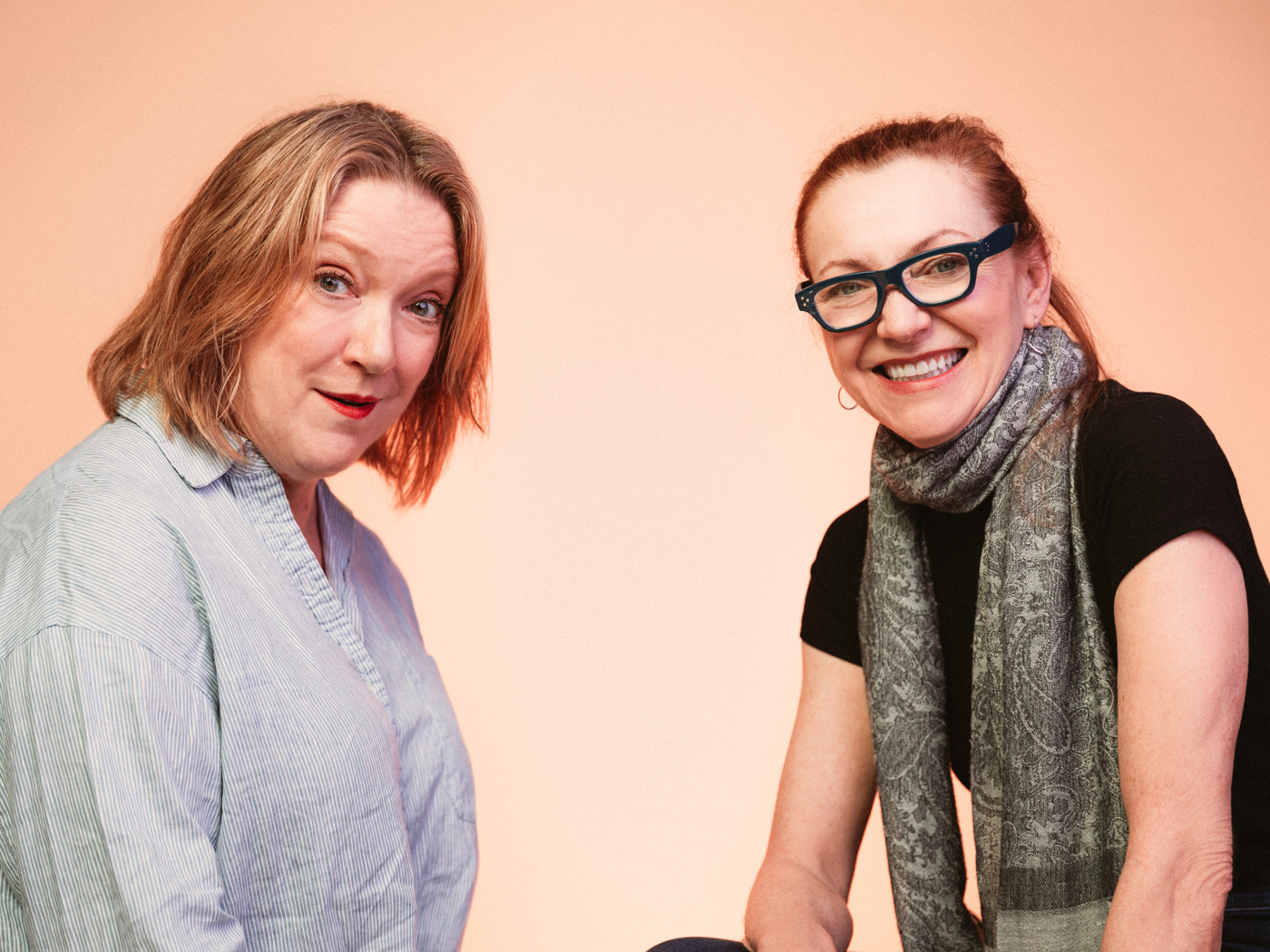
And now you both have Tony nominations.
Kristine: I know! Cut to— What happened?!
Julie: That's right. We don't need more than five days' rehearsal.
Kristine: That's it! Any more and you won't get that Tony!
Julie: Way to go, nominators! The only place they kind of screwed up was that they didn't they nominate Nathan. But he already won it in my mind. Come see the play. It's an extraordinary performance.
Let's talk about these characters. What would Janice, for example, be like in a different work environment?
Kristine: Well, I think she's a little anal retentive. She'd have to be cleaning. Wherever she is would be neat; everything set perfectly.
Julie: She's a boss.
Kristine: If she were in a modern thing, she'd be one of those people who clean up murder scenes. What a dreary, horrible job—but she’d do it efficiently. It would be spotless, and she would be proud of that afterward. She can sort of compartmentalize all the ugly, and not deal with it. She could also be one of those mean nurses who'd be like, “Stop crying! Suck it up!” Or maybe the home aide from hell.
Julie: I think Janice should run the world, frankly. By the end of the play, she's going to go off and run the world.
What about Carol?
Julie: I have a tendency to make all my characters be some aspect of me. Very early on, I thought about myself riding in the bus to the Women's March, and how depressed I was. I was thinking, “This seems stupid.” But then somebody gave me a hand-knit hat, and I put it on, and I started walking. And everybody had these hilarious and touching and amazing homemade signs, and there were little kids in a bunch of different versions of this knitted cap—all that pink. There were so many of us, you couldn't march anywhere. We finally just yelled, “Let's march! Let's march!” But we were basically stuck over by the Porta-Potties. I feel that Carol wants to do the right thing, but she doesn't know how.
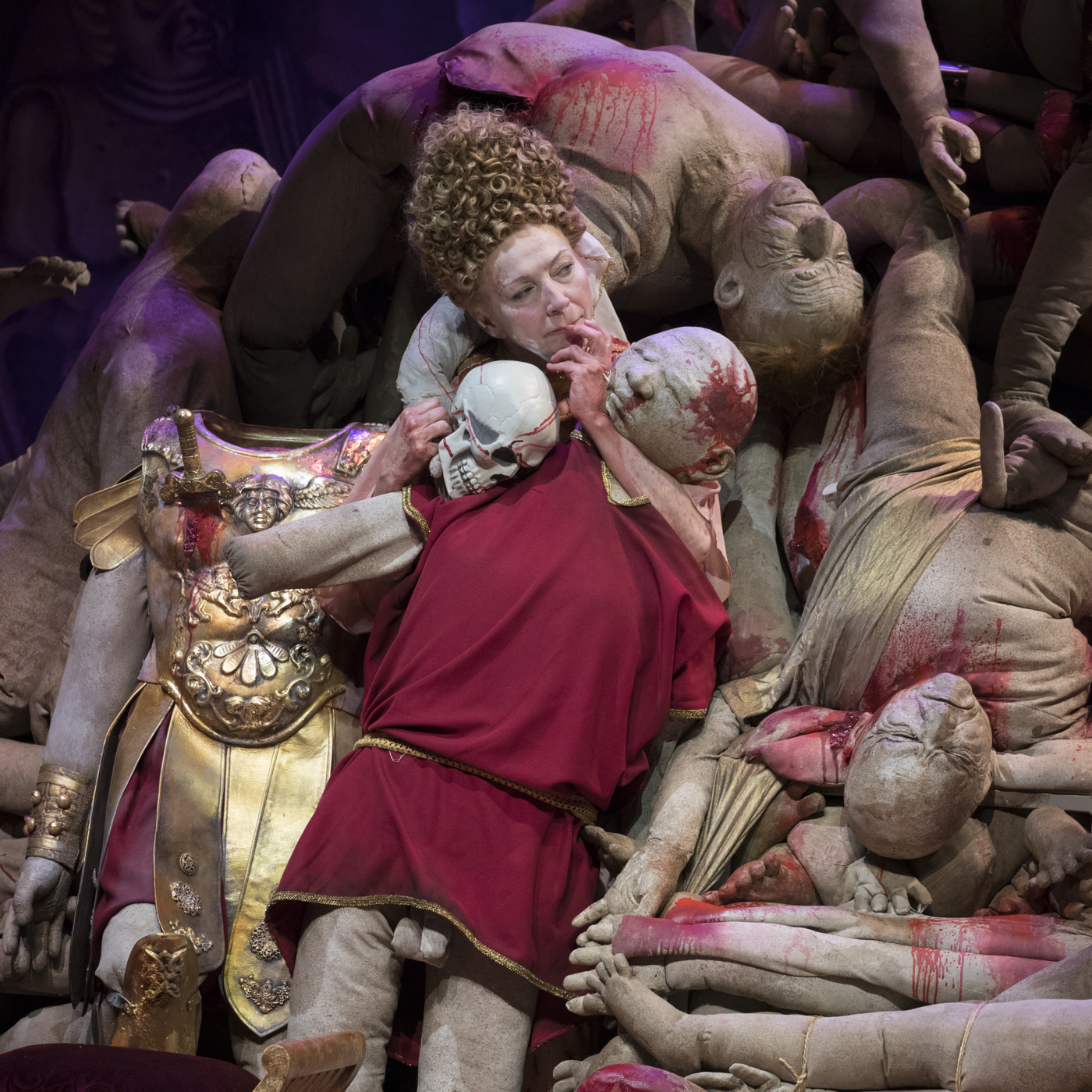
Kristine: Yeah, she's a bit of a scaredy cat, which we all are.
Julie: Yeah—and in a panic!
Is it challenging to find the energy to be in a panic?
Kristine: The play invites 110 percent from the top.
Julie: There's a sense of overwhelm for the audience the minute the curtain goes up.
Kristine: There is the time pressure, you know? There is an inauguration happening. This war is cyclical. It's constantly happening. Who's in, who's on first? You just kind of tap-dance your way to solving things—getting all these bodies sorted.
Julie: [Director George C. Wolfe] also did a brilliant thing where he added a cue: When we leave the stage, you hear the sound of like a door opening and what's going on outside. It's just screaming.
Kristine: Chaos.
Julie: We're functioning in this place, but the raging tragedy goes on all around us.
Do you get desensitized to the tragedy of it?
Kristine: There are times when you laugh at them, and there are times when they are profoundly sad. The bodies remind you of the cost.
Julie: When I see them for the first time every night, they are very horrifying to me. I'm always just crying as soon as he takes the sheet off of the women and children. We always say, like on the knife's edge, it's crazy, it's silly, and then it's also just all the guts. All the guts are there.
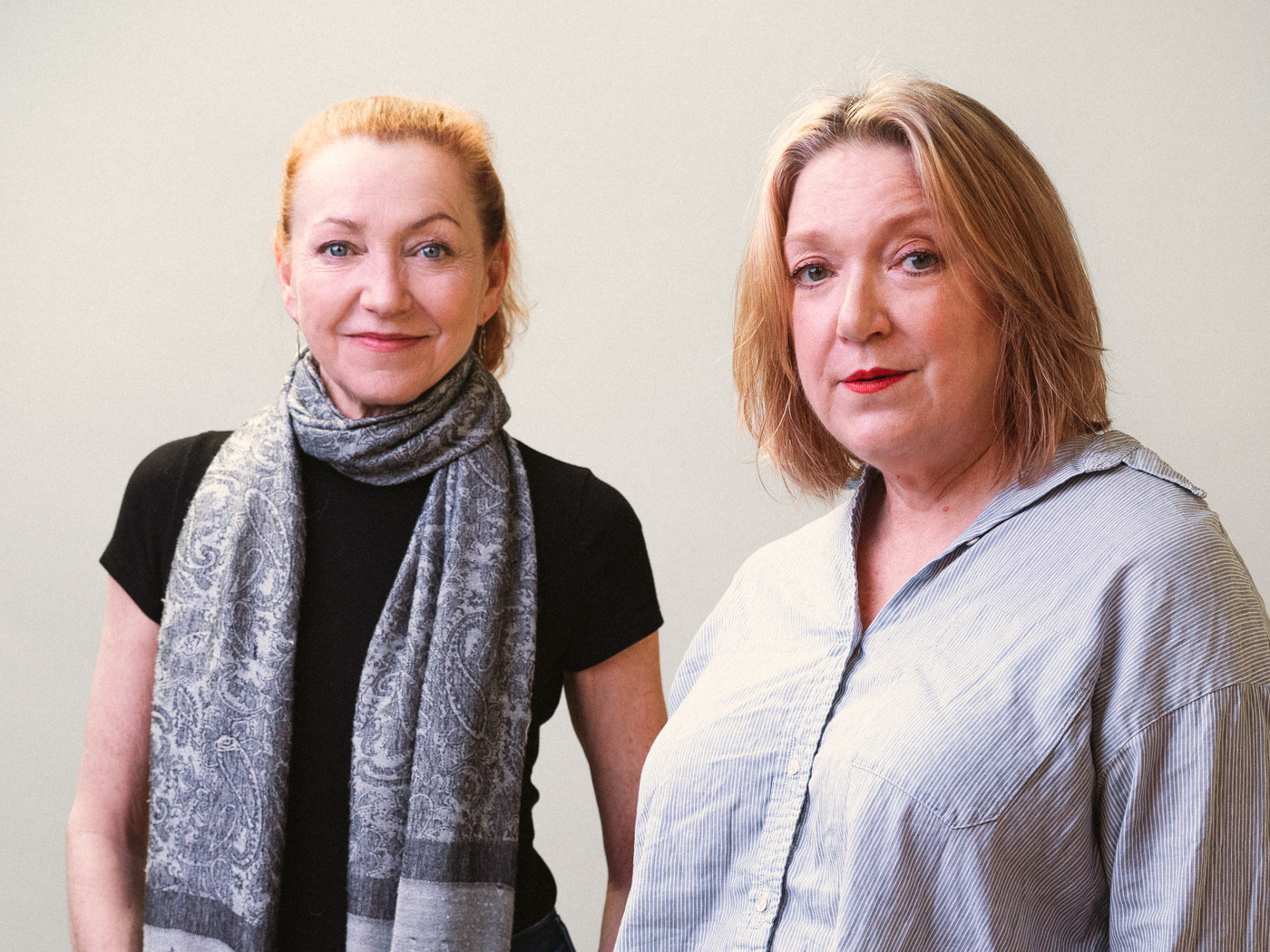
Kristine: I just love doing this because I think it's about the world, without being literally about specific things in the world. It's the currents that are everywhere. People in England could see this. People in Venezuela could see it. People in Spain. I mean, all the chaos that is out there that is just the time.
Julie: So true. I feel so enormously proud to be in it.
Kristine: We're showing the world. I had someone who came and said, “You know what this play actually showed me the most? Hope.” We're going to survive it—all this chaos that's out there! We're going to get past it because it's cyclical. We're going to be OK. There'll be a Janice and a Gary and a Carol who will make a difference. They'll make that one little step.
